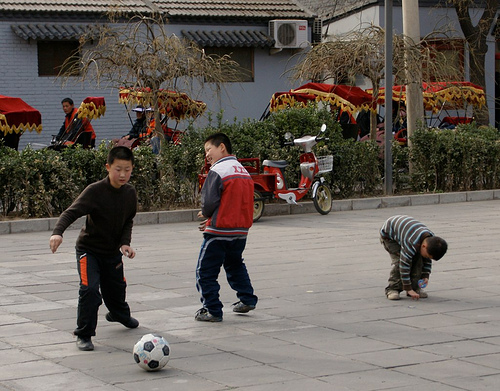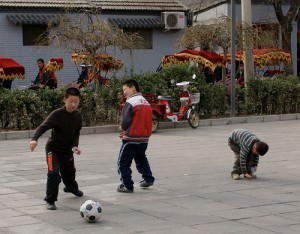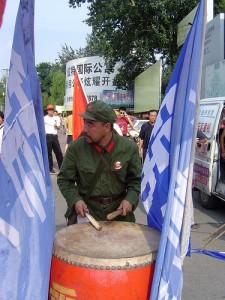Editor’s Note: This post was originally published on Modernleifeng.com in July 2010. At that point, days before the World Cup final between Spain and Holland, there was a lot of discussion in Chinese media and online about the sorry state of Chinese soccer and why they continued to fail when it came to international competitions. Unfortunately, my optimism about the Gao era at the time was ruined by the young side’s performance at the Asian Cup this year and then crushed when he was fired. Now with Camacho in charge, I’d like to be optimistic about the future of the game, but it will take some major changes in the Spaniard’s philosophy. Having just officially been eliminated from 2014 World Cup qualifying, China needs to return to the drawing board. I’m posting this as-is and later in the week will post some potential solutions to the problems that afflict the national team.
A lot has been written about how much Chinese love soccer and the spectacle of the World Cup, but the Chinese team is sitting at home, having yet again failed to qualify. They talk about a nation of 1.3 billion not being able to produce 11 great players. They talk and talk and talk about why this is the case, about what is wrong with the system, and what needs to be changed. Some of the talk is good, some is bad, much of it is mystified as to what is wrong.
As someone who writes a lot (perhaps too much) on Chinese soccer, I had to throw my hat in the ring. First off, I think there needs to be a clarification, there’s a difference in answering why the Chinese team continues to fail vs. why a country of 1.3 billion people can’t field a better football side. Also, excuses about things like the lack of fields is a complete cop out if you look at how soccer is played by kids everywhere else in the world. On top of that, I’ve seen plenty of foreign kids kicking balls around their apartment community, but rarely if ever Chinese kids. So let’s get to the explanations and possible solutions. So here’s my assessment of the real problems.
1. the Education System
The dog eat dog nature of the Chinese education system is unbelievable. From a young age, kids must go from the “right” elementary school to the “right” junior high to the “right” high school if they have a prayer of getting into the “right” college. The concept of “playtime” doesn’t exist for most kids, they get out of school (later than in most places in the world) and then go home to study or to an after school program. They don’t have time to kick a ball around and their parents would be unhappy if they caught them using their time in such a frivolous manner. There are no grass roots weekend youth soccer programs like you find in the US, but even in the few that do exist, expat kids are in the majority. Among some in the middle/upper class in China, who’ve been educated and/or spent a lot of time abroad, there is a growing looseness and allowing their kids more time to be kids, but they often will only choose a single activity and those tend to be something along the lines of golf or hockey, a more “exotic” sport that makes their kid unique among his peers. The large size of China’s population, the reason why so many people think it should be so easy to find 11 decent soccer players, also hurts it, with so many young people competing for a finite number of university spots, an hour or two kicking a ball around is seen as a waste of time.
2. Sports Schools
Connected with the above point is the Chinese system of sports schools. Kids as young as 7 are watched by coaches from local sports schools and chosen to take part in afterschool sports training or leave the normal education path to attend a sports school. At the same time, parents view their kid’s failure to be selected as a sign they aren’t good enough and that their focus needs to be on getting a good education. The sports schools usually stop making their selections around age 11 or 12, meaning that any late developers are pretty much out of luck, and ignoring a massive segment of the population. While this is important if you’re choosing small statured gymnasts or looking for tall basketball players, it doesn’t jive with what’s needed to be a star soccer player.
3. Soccer Can’t Be Taught
The sports China excels in, ping pong, badminton, diving, weightlifting, etc., are all sports that are focused on a repetitive motion. Practicing the same motions 1,000 times a day, day in day out will perfect your skills and lead to success. Soccer doesn’t work that way, it isn’t possible to “teach” the game in the same way. Players need to be creative, anticipating not only what the opponent will do but what their teammates will do, and everyone needs to work together as a team, not just 11 individuals. In China, more often than not, the team’s play a rigid form of soccer, lacking the creativity and the flair you see elsewhere in the world, and when players display that flair, it often fails because teammates don’t expect it. Young Chinese talent needs to go overseas to train and play against other people, to build up that mental database of different ways to play and different systems.
4. Work Ethic
Chinese youth teams often are very successful, but when they get into their late teens and early 20s and are hanging around with their Chinese Super League (Chinese Super League) teammates, they start picking up bad habits from their older teammates. There tends to be a culture of laziness in the Chinese Super League, I’m not going to blame it on corruption, but this is one element of it. The older players are making a lot of money and happy to be the best in China, they don’t feel the need to work hard and push to try and garner the attention of an overseas club. The rules are different for the stars versus the average players and the young starlets see the older stars not working hard and they emulate them.
5. Lack of a Plan
The CFA is under the control of the General Administration of Sport, which is under the control of the Chinese government. For a government known for its (often successful) central planning, China’s failed miserably in coming up with a plan for their soccer team. In the past 10 years, China has gone through 8 coaches (counting the odd “two headed Serb situation” as 1) , a level of upheaval in the extreme. Often because the CFA fired the last coach and still has to pay his salary, they have little money to pay a new coach and end up with a less than ideal option. Every new coach has brought with him a new system and they’ve each had their own favorite players. Unlike the other teams around the world (like Korea or the US) that have turned themselves into regional powerhouses capable of beating anybody in the world, China’s failed to put into place a longterm plan for success. Internal changes in the CFA have brought with it different leaders with different plans and ideas, each stupider and more bound to failure than the one that came before it. Current manager Gao Hongbo, a former national team player himself, seems to have an understanding of what it takes to succeed and his bringing along younger players has brought China greater hope for the future, but there also needs to be some attention to what will come next, 4 or 5 years down the road.
Conclusion
Nothing can be done to change the state of the education system, so we need to look beyond that. The sports school system is also highly unlikely to change as China sees its success in other sports as a validation that it works (even if it has failed to work in almost all team sport situations). The key to getting around the fact soccer can’t be taught is sending more players abroad for training. The Jianlibao side that went to Brazil for a few years of training produced future national team stars like Li Tie, Li Jinyu, and Li Weifeng as well as a number of solid domestic league players like Tao Wei and Zhang Yonghai. It seems the work ethic problem has improved with Gao Hongbo taking charge of the national team. As a former player himself and with a strong understanding of the Chinese game, Gao has instilled a new attitude into the younger players, getting more out of them than previous coaches. When it comes to lacking a plan, I’m less than optimistic about it, current head of the CFA Wei Di is nothing but a bureaucrat whose been in charge of a number of other sports in China, but doesn’t have any soccer credentials. Hopefully, he’ll let the soccer people like Gao handle things instead of coming up with stupid plans to have the Olympic team play against the professionals.
A bonus reason, failure is expected, also needs to be considered. Over the last few years, on paper the Chinese side should be able to beat many of the teams it has played, however the prevailing attitude of the country’s fans and media seems to have been adopted by the players. When the team’s down by one or in a tied match late, they don’t seem to show the fight that we’ve seen so many teams display in the World Cup, instead the attitude among the players seems to be that losing is a foregone conclusion. This is another thing that appears to be changing under Gao, who will hopefully be around through World Cup 2014 qualifying (and hopefully coaching the side in the World Cup, if one can dream), but this needs to be a solid, permanent change that will last even if a new coach is appointed.



Great article…”Failure is to be expected” …like a premonition.
All good points about education, having a long-term plan (and sticking to it), and getting the players to be passionate footballers (not just professionals).
The notion of sending players abroad is a double edged sword though. I’d like to think there are ways of confronting the problem more directly (bringing the grassroots game to undeveloped areas, bringing expert foreign coaches to China at the youth level, and even developing street football and small side matches). Sending players abroad may circumvent serious obstacles in China, and develop a few more successful players that have an impact on the international level, but it’s only delaying the inevitable need to confront such obstacles.
Like mentioned in the article; a long term plan with long term goals will yield results. Repeatedly changing the system and leading coaches for immediate success is like a dog chasing its tale.
I don’t want this to be a “love fest”, but I completely agree. I think first and foremost, the game inside China needs to be developed at the youngest levels and better coaches, not necessarily all from abroad (more on this when the post is up), need to be involved. However, I do think that players in their mid teens should spend some time abroad, both to give them a new experience, give them a chance to acclimate to a new culture (hopefully this will be helpful when foreign teams come calling later in their career), and to open them up to new techniques.
Nice article, and quite prescient too.
I’d like to ask though, in the 90s China sent some youths, such as Li Tie, to Brazil to train in football and it was said to have been successful. Why didn’t they repeat this? Or did they, but the ensuing guys weren’t as good as the first batch?
Simple answer is that it goes to the lack of a longterm plan, in the late 90s, there was some unrest in the CFA and they changed leaders in 2000, the new leaders didn’t want to keep it going.
Why am I not surprised. Thanks for the reply. Looking forward to your upcoming update on this topic.
mmmm…
i’ve still couldn’t figure out why China failed again…dun think it’s the above reasons…
I think this is the mystery of football….
But China definitely has huge potential, which everyone recognise…
After all, look at Spain….years of being the perennial under achiever, they finally won WC and Euro …
I guess, the best thing China can do is keep on trying, never give up….
There is no mystery. Of course the above are infrastructural reasons stopping development…but arguably, the biggest problem with Chinese football is the STIGMA attached to it!
The first words that come to mind to most Chines people when they think of Chinese football they think of:
-Disappointment (recent WC and AC campaigns)
-Corruption (2009 and 2002 scandals)
At the moment the future of Chinese football is clouded by such beliefs. Having a vision beyond these words, working with the infrastructure and coming up with youth developmental and business solutions that are effective in China will bring positive change.
Yes, but also the Chinese public needs to support its football regardless of how successful or otherwise it is, bashing football around here is a national pass time, considering how few people play the sport here, the national team could be doing a lot worse.